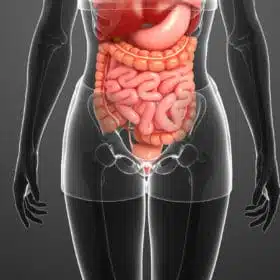Today, if you want to achieve efficient success in sports or strength training as a woman, you need not only the right training program but also the optimal Nutritionso that there is enough energy for the sweaty workout. But how does the athlete know whether she has taken in enough protein or carbohydrates? And how does she know her actual need of calories and macronutrients necessary for her individual energy consumption? Below we have given you a calculation basis to help you accurately calculate the actual calorie count and associated nutrient values for the day.
Basal metabolic rate + actual consumption
When we exercise or work, we need energy, which we take in mainly through food and is measured as calories. In order for us to calculate the daily number of calories we need for our physical exertions, we first need the basal metabolic rate (BMR). The basal metabolic rate defines the amount of energy the body needs per day, without exercise and at complete rest, at an indifference temperature, to maintain its major functions in a fasting state. The basal metabolic rate depends on age, weight, sex and body size. To the basal metabolic rate we add the number of calories you need for your physical activity. This number refers to the particular sport or physical work you do during the day. Now we add another 10 percent for the TEF (thermic effect of food). The so-called thermic effect of food defines the energy consumption that occurs after the consumption of a meal due to the digestion and processing of nutrients in the body. Thus, we can calculate the total calorie requirement for a day with the sum of basal metabolic rate + work metabolic rate + 10 % TEF. Now that we have calculated the calorie count for the day, we divide that number into the nutrients to be ingested, which for intense strength training should be 30 percent protein, 50 percent carbohydrates and 20 percent fat. If you are not strength training, you don't need as much protein and should eat more carbohydrates rather than energy intake.
Calculation of the necessary calorie consumption per day
Below we want to calculate the daily energy requirement in calories and grams, which is necessary if a total calorie consumption of 2600 calories per day was calculated.
Example: the required number of calories of each nutrient for 2600 total calories per day:
- 30% of 2600 = 780 calories, which are considered to be Protein should be taken.
- 50% of 2600 = 1300 calories, which are considered to be Carbohydrates should be taken.
- 20% of 2600 = 520 calories, which are considered to be Fat should be taken.
Protein and carbohydrates contain 4 calories per gram, whereas the macronutrient fat contains 9 calories per gram.
Converted calorie requirement per day in grams:
780 calories of protein divided by 4 = 195 grams of protein per day
1300 calories of carbohydrates divided by 4 = 325 grams of carbohydrates per day.
520 calories fat by 9 = 58 fat per day
Now, when we have the final gram and calorie count for the day, we begin to convert the calculated data to the individual meals we need for our training day. If we limit this large number of calories to only three daily meals, then we would have to eat very lavish meals that would not be beneficial to our well-being. It is important to have a constant high sugar level throughout the day, which does not make us tired and always provides sufficient energy. It is therefore important that we spread the total calories over six meals, which we distribute evenly throughout the day. Please make sure that you always eat a new meal no later than three hours after your last meal. You should take this rule into account especially during muscle building and intensive strength training.
The calorie calculation related to each meal:
195 grams of protein distributed over 6 meals = 33 grams of protein per meal
325 grams of carbohydrates distributed over 6 meals = 54 grams of carbohydrates per meal.
58 grams of fat distributed over 6 meals = 10 grams of fat per meal
Below are some examples of the three macronutrients (list not exhaustive, of course):
Protein:
Low-fat meat, poultry, fish, beans, eggs, nuts.
Carbohydrates:
Fruit, rice, pasta, potatoes, cereals.
Fat:
Cold pressed olive oil, fatty fish, flaxseed oil, sesame oil, nut oil, nuts.
If you have already planned your daily meals for the coming days, you can use a calorie counter or an app to calculate exactly how many calories and nutrients your meals should contain. Now you only have to compare the calculated data with the calculation of total metabolic rate + work metabolic rate + TEF and you can calculate exactly whether you need to change your meals or whether they are suitable for your necessary energy metabolic rate. With this calculation base you can calculate the daily calorie requirement and provide for a sufficient amount of energy on training days and in the regeneration phase.
Reset your Body
Do something good for your body. Press reset and give yourself a fresh start! With our Reset your Body Bundle, your metabolism, immune system and digestive tract will be revitalized in a healthy way.
Reset your Body



